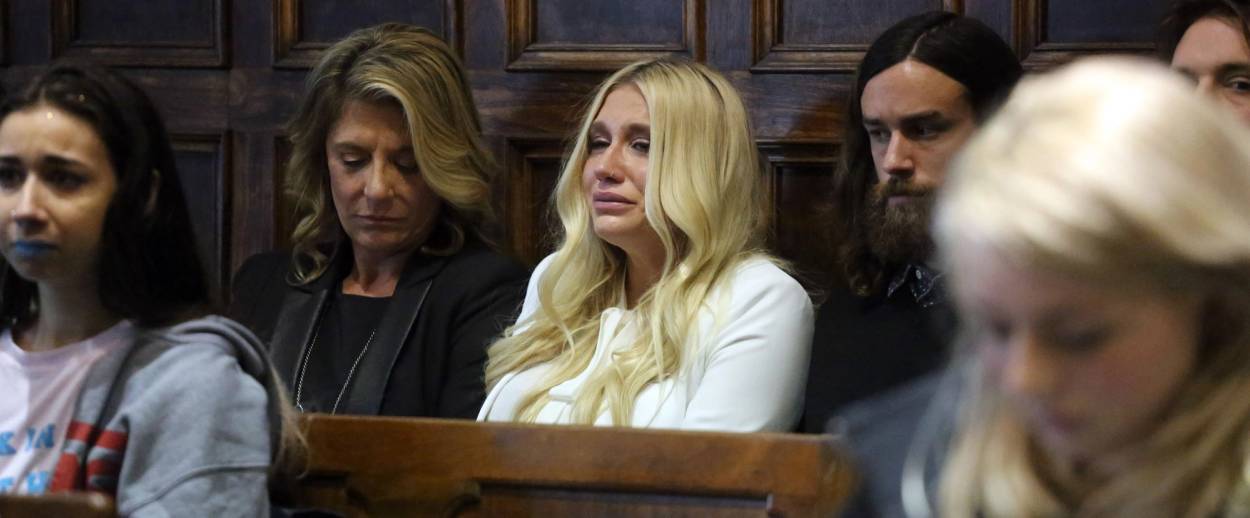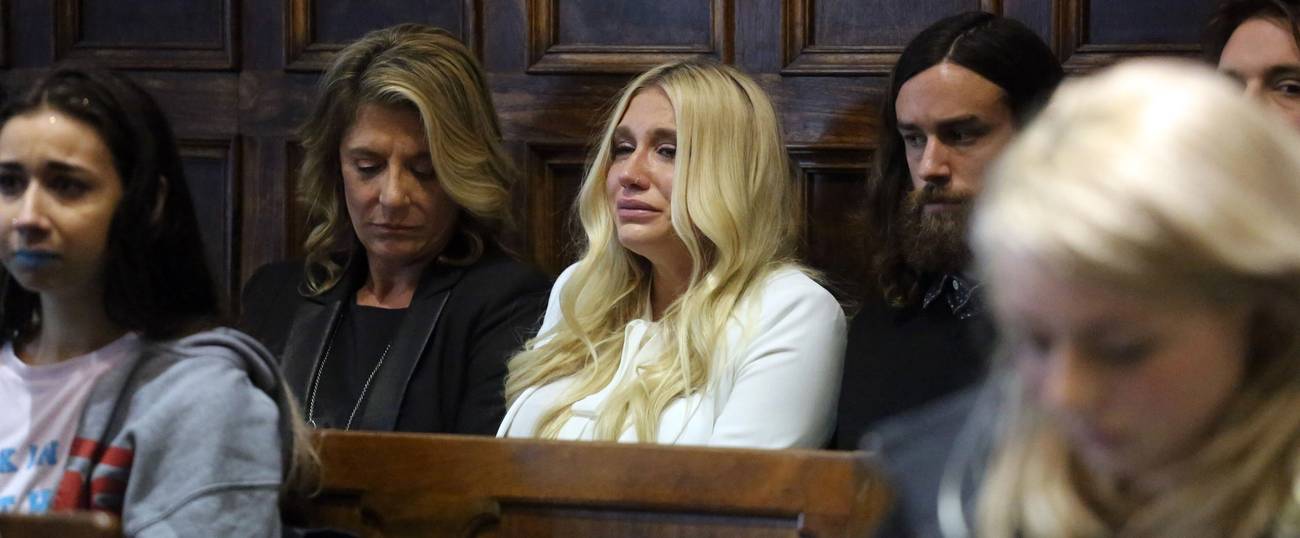Kesha, Agunah
The pop singer’s draconian contract ties her to a man she says abused her. That’s a familiar story to some Jewish women.




Kesha is a chained woman.
If you think comparing the pop singer to agunot—the unfortunate Jewish women whose husbands refuse to grant them a get, or religious divorce—is a bit much, consider the singer’s sorrows.
In 2005, Kesha, then a senior in high school, met Lukasz Guttwald, or Dr. Luke. The producer had already written Kelly Clarkson two hit songs—“Since U Been Gone” and “Behind These Hazel Eyes”—and other pop meteors on the rise, including Pink and Avril Lavigne, were in his orbit. By most accounts, he charmed Kesha into dropping out of school and signing with his record label instead.
The first few years were as tough and as sweet as beginnings ought to be, thick with embarrassing gigs (that’s Kesha crooning in the background of Paris Hilton’s mortifying single “Nothing in This World”), false starts, and glimmers of hope. Then came success, appearing, as is its custom, overnight and without much notice: Kesha’s first album, Animal, was released in January of 2010, debuting at No. 1 on the Billboard albums chart. The album’s first single, “Tik Tok,” an ode to drink, dance, and other staples of louche life, shot to the top of the charts as well and stayed there for nine weeks, a feat unmatched by a female artist since Debby Boone crooned“You Light Up My Life” in 1977. More fame followed, as did its usual trappings, including stints in rehab, abandoned projects, and rumors galore. Then, in October of 2014, Kesha sued Dr. Luke.
Even to those of us reared on Behind the Music, the lawsuit reads as a particularly harrowing story of broken trust and predatory abuse. Guttwald, Kesha alleged in her suit, had given her Gamma-Hydroxybutyrate, a “date rape” drug; on one occasion, the lawsuit claims, Kesha “took the pills and woke up the following afternoon, naked in Dr. Luke’s bed, sore and sick, with no memory of how she got there.” With that and other alleged assaults in mind, she asked the court to annul the contract that bound her to Guttwald.
Last month, a New York Supreme Court justice finally offered a ruling, finding against Kesha and obliging her to continue and work with the man she said had raped her. “You’re asking the court to decimate a contract that was heavily negotiated and typical for the industry,” said Justice Shirley Kornreich. “My instinct is to do the commercially reasonable thing.”
Kesha’s colleagues found her plight less than reasonable. Lady Gaga, Ariana Grande, and many other musicians tweeted words of encouragement and support. Clarkson took to social media to make a disparaging comment about Guttwald. Taylor Swift offered her support and a check for $250,000 to help Kesha with her legal expenses. Sony Music, the parent company of Guttwald’s label, offered its own sympathies: “Sony has made it possible for Kesha to record without any connection, involvement or interaction with Luke whatsoever,” read an official statement, “but Sony is not in a position to terminate the contractual relationship between Luke and Kesha.” Sony, the statement continued, “is doing everything it can to support the artist in these circumstances, but is legally unable to terminate the contract to which it is not a party.”
The wall-to-wall empathy, the earnest attempts to offer help, the strict contract which no earthly court can annul—these are the staples of every story about chained women.
Like Kesha, to name but one example of too many, Rivky Stein was bound to a man at 18, marrying Yoel Weiss, seven years her elder. Before too long, she alleged in a recent lawsuit, Weiss threatened her, beat her, and raped her on her wedding night and repeatedly thereafter. She ran away, mustered the courage to speak up, and asked for a divorce. A crowdfunding site raised more than $20,000. Friends and strangers sent kind thoughts on Facebook. Rabbis were willing to help. But nothing could be done: A contract’s a contract, and ancient halakhic precedent, just like its modern commercial offspring, allows little if any room for the breaking of bonds.
Some rabbis active in bringing justice to agunot may know just how the lawyers at Sony Music are feeling these days. A few, to bring up another famous case, rushed to help Tamar Epstein unchain herself from her husband, a recalcitrant congressional aide. The two were civilly divorced, but the husband then refused a get, making a second marriage impossible for Epstein. She found an unnamed Orthodox rabbi in Philadelphia who agreed to follow in the spirit of the civil court and annul Epstein’s first marriage religiously as well, but most of the Orthodox establishment, though sympathetic, refused to accept the precedent and recognize Epstein’s second nuptials. Even more proactive were the rabbis siding with Lea Choai against her get-refusing husband Yechiel Friedman: In an official psak, or decision, issued in 2014 by the Orthodox Beth Din of America, a religious court that rules mainly on issues of family law, a handful of prominent rabbis called for Friedman to be effectively removed from the community until he conceded to free his wife. Even that did not help.
These brave women’s stories rarely make international news. Kesha’s did. But the seeming impossibility of attaining justice in both cases should shock us into understanding the hard, unsubtle barriers in our legal systems—and, sometimes, our hearts—that deny women basic safety, dignity, and agency. There may not be an abuser in every man, but any woman could be Kesha.
***
Like this article? Sign up for our Daily Digest to get Tablet Magazine’s new content in your inbox each morning.
Liel Leibovitz is editor-at-large for Tablet Magazine and a host of its weekly culture podcast Unorthodox and daily Talmud podcast Take One. He is the editor of Zionism: The Tablet Guide.